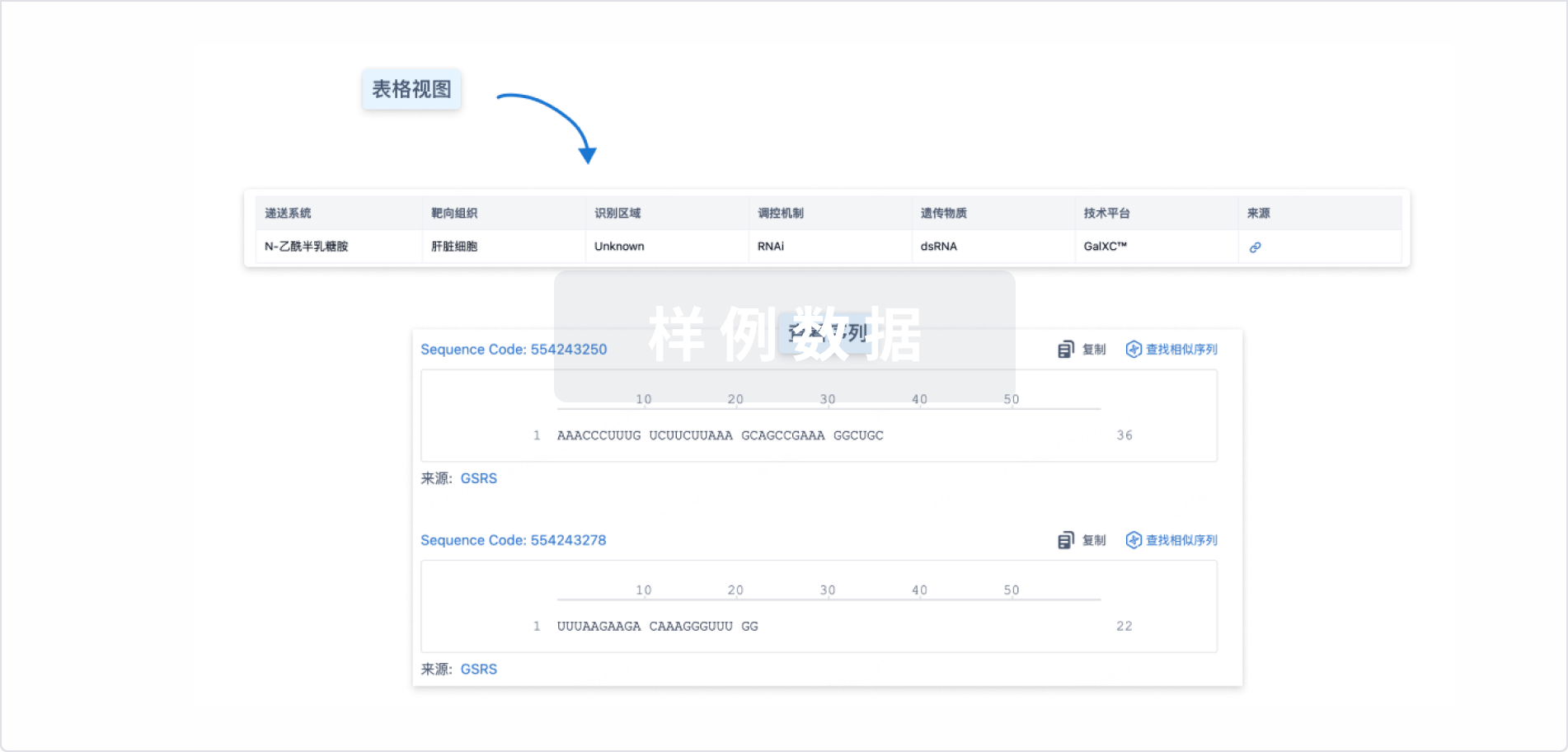预约演示
更新于:2024-11-21
RN0361
更新于:2024-11-21
概要
基本信息
药物类型 siRNA |
别名 |
靶点 |
作用机制 APOC3调节剂(载脂蛋白C-Ⅲ调节剂) |
治疗领域- |
在研适应症- |
非在研适应症- |
非在研机构- |
最高研发阶段临床1期 |
首次获批日期- |
最高研发阶段(中国)- |
特殊审评- |
登录后查看时间轴
结构/序列
使用我们的RNA技术数据为新药研发加速。
登录
或

关联
1
项与 RN0361 相关的临床试验NCT06471543
A Phase 1, Randomized, Single-blinded, Placebo-controlled, Single and Multiple Ascending Dose Study to Evaluate the Safety, Tolerability, Pharmacokinetics, Pharmacodynamic Effects and Immunogenicity of RN0361 in Adult Subjects With Elevated Triglycerides
The purpose of this study is to evaluate the safety, tolerability, pharmacokinetics, pharmacodynamics and immunogenicity of single and multiple doses of RN0361 in Adult subjects.
开始日期2024-09-30 |
申办/合作机构 |
100 项与 RN0361 相关的临床结果
登录后查看更多信息
100 项与 RN0361 相关的转化医学
登录后查看更多信息
100 项与 RN0361 相关的专利(医药)
登录后查看更多信息
10
项与 RN0361 相关的新闻(医药)2024-11-18
Rona Therapeutics unveiled promising early-stage findings for its PCSK9-targeted siRNA therapy, dubbed RN0191, at the American Heart Association's (AHA) annual scientific sessions on Sunday, demonstrating notable reductions in PCSK9 and low-density lipoprotein cholesterol (LDL-C) after a single dose. The Shanghai-based biotech gained the asset securing exclusive global rights to Sanofi’s siRNA platform in 2022. Touting 'best-in-class' prospects, Rona CEO Stella Shi, said the “results highlight RN0191's potential as a transformative siRNA therapy for global patients with elevated LDL-C…either as single agent therapy or as combinatory backbone to improve cardiovascular outcome."The Phase I study randomised 32 healthy participants aged 18 to 60, to receive a single dose of RN0191 in the range of 60 mg to 600 mg or placebo. Results showed that the RN0191 group achieved up to 95% maximum reduction in PCSK9 and a 74% drop in LDL-C, with average reductions of 87% and 56%, respectively, compared with placebo. Moreover, RN0191 maintained up to 42% LDL-C reduction at six months, indicating suitability for bi-annual dosing. Additionally, RN0191 demonstrated significant reductions in ApoB, Lipoprotein(a), non-high-density lipoprotein cholesterol and total cholesterol. In terms of safety, the therapy had no serious adverse events, with only mild and short-term side effects reported at all doses.Following a $33-million Series A round in 2022, Rona secured another $35 million this year to advance RN0191 and another lipid-lowering siRNA against APOC3, named RN0361, into mid-stage testing. Besides dyslipidaemia, the company’s pipeline features a range of liver-directed siRNA therapies being developed for obesity, metabolic dysfunction-associated steatohepatitis, atherosclerotic cardiovascular disease, IgA nephropathy and hypertension.
临床结果AHA会议临床1期
2024-10-22
·医药观澜
▎药明康德内容团队报道
随着今年的诺贝尔生理学或医学奖花落微小RNA(microRNA)领域,RNA疗法以及其蕴含的疾病治疗潜力再次引起广泛关注。事实上,核酸类药物已经成为当下新药开发的重要组成部分,小干扰核酸(siRNA)、反义寡核苷酸(ASO)、mRNA药物等药物类型”百花齐放“,在不同疾病的治疗中接连取得突破。
在中国,核酸类药物也进展颇多。根据中国国家药监局药品审评中心(CDE)官网,今年以来,至少有13款核酸类创新药首次在中国获批IND,针对的疾病领域涵盖了罕见病、心血管疾病、感染性疾病、癌前病变等类型。通过梳理,其中大部分药物来自近几年新成立的临床阶段创新药公司。本文将根据公开资料梳理这些产品的公开信息。
大睿生物:RN0191注射液
作用机制:靶向PCSK9的siRNA
RN0191注射液为大睿生物首款自主研发的siRNA产品,为一款针对PCSK9靶点的双链小干扰RNA(siRNA)。该产品于今年1月在中国获批IND,拟开发用于治疗高胆固醇血症、混合型高脂血症以及动脉粥样硬化性心血管疾病,以降低心血管事件发生的风险。临床前研究显示,该产品具有强效且持久的药理活性和良好的安全性,有望每年仅需两针即可显著持续降低血清中低密度脂蛋白胆固醇(LDL-C)水平。
大睿生物是一家核酸创新药平台公司,专注于代谢性疾病和中枢神经退行性疾病的治疗。今年7月,该公司还宣布完成了A+轮3500万美元融资。今年7月,该公司第二款siRNA管线项目RN0361(靶向APOC3)也已经在澳大利亚获批临床。
先衍生物:A24110He注射液
作用机制:靶向ANGPTL4的ASO药物
A24110He注射液是由Lipigon Pharmaceuticals开发的靶向ANGPTL4的ASO药物,于今年3月在中国获批IND,拟开发治疗严重高甘油三酯血症。先衍生物拥有该品种在大中华区的权益,并将与Lipigon公司共同推进临床开发。ANGPTL4是一种在脂肪组织中高度表达的蛋白,也是近年来取得研究突破的可应用于降脂治疗的全新药物靶点。A24110He注射液旨在长效降低甘油三酯的同时改善胰岛素抵抗,用于治疗血脂异常,尤其是严重高甘油三酯血症患者。
靖因药业:SRSD107注射液
作用机制:长效抗凝siRNA药物
SRSD107注射液是一款双链小干扰核酸(siRNA)药物,于今年3月在中国获批IND,拟开发用于预防或治疗动静脉血栓。该产品可通过特异性肝靶向凝血因子XI(FXI)mRNA,抑制FXI的蛋白表达,阻断内源性凝血途径的激活,从而达到抗凝血/抗血栓的作用。临床前研究数据显示,单次皮下注射SRSD107可实现几乎100%敲低FXI表达的效果,且持续时间达半年之久,同时未见出血。靖因药业成立于2021年,聚焦新一代核酸创新疗法在心血管疾病领域的开发。2023年10月,该公司宣布完成了6000万美元B轮融资。
吉盛澳玛生物、君实生物:IAMA-001鼻用喷雾剂
作用机制:小核酸免疫调节剂
IAMA-001鼻用喷雾剂是一款小核酸免疫调节剂,拟开发用于治疗季节性过敏性鼻炎。该产品于今年3月在中国获批IND。今年9月,君实生物控股子公司君拓生物与吉盛澳玛生物签署协议,获得在大中华区(包括中国大陆、香港、澳门和台湾地区)研发、生产、商业化等以及以其他任何方式利用IAMA-001小核酸免疫调节剂鼻用喷雾剂型药物的独占许可权利。该项合作的总金额约15亿元,包括4000万元人民币首付款。
再生元:cemdisiran注射液
作用机制:靶向C5补体的siRNA药物
今年3月,再生元(Regeneron)申报的cemdisiran注射液与pozelimab注射液的联合疗法在中国获批临床,用于治疗伴有活动性体征和溶血迹象的阵发性夜间血红蛋白尿(PNH)成年男性和女性患者。Cemdisiran是一种皮下注射、靶向C5补体的siRNA药物,pozelimab是一款新一代C5补体抗体疗法。再生元正在开发C5抑制剂“抗体+siRNA”组合疗法来治疗补体介导的疾病。该组合疗法的优势在于能够在较低剂量下达到完全、持续的C5抑制,减少给药频率,并且皮下给药方便临床应用。
瑞宏迪医药:注射用RGL-2102
作用机制:mRNA替代疗法药物
RGL-2102是瑞宏迪医药首款mRNA蛋白替代疗法药物,于今年4月在中国获批IND,适应症为下肢缺血性疾病。这是一款由脂质体 (LNP) 包载的mRNA,给药后可在体内翻译得到目的人源蛋白,有望促进下肢缺血性疾病患者缺血下肢血管新生,建立侧枝循环,改善缺血区域的血流灌注。瑞宏迪医药是恒瑞医药的子公司,成立于2021年8月,是一家专注于AAV基因治疗、mRNA及细胞治疗药物开发的生物医药公司。今年10月,该公司的AAV双基因疗法1类新药也在中国获批临床,拟开发治疗帕金森病。
舶临医药:BW-20507注射液
作用机制:靶向HBV的siRNA药物
舶临医药为舶望制药子公司,该公司申报的BW-20507注射液于今年5月在中国获批IND,拟开发治疗慢性乙型肝炎病毒感染。舶望制药是一家处于临床阶段的生物技术公司,成立于2021年,致力于开发新一代siRNA药物。公开资料显示,BW-20507是一种靶向乙型肝炎病毒(HBV)的siRNA药物,该产品目前已经在中国启动1期临床研究。
中美瑞康:RAG-17注射液
作用机制:靶向SOD1的siRNA药物
中美瑞康研发的RAG-17注射液于今年5月在中国获批IND,拟用于治疗成人因超氧化物歧化酶1(SOD1)突变引起的肌萎缩侧索硬化症(ALS,俗称“渐冻症”)。中美瑞康成立于2017年,致力于开发创新小核酸药物与疾病治疗方法。RAG-17是该公司在研的一款以SOD1为靶基因的双链siRNA药物,通过降低SOD1基因表达来治疗SOD1突变所致的ALS患者。RAG-17采用了中美瑞康自主开发的递送平台,以实现中枢神经系统的高效递送。该产品治疗“渐冻症”已经获得FDA授予的孤儿药资格。
艾码生物:ER2001注射液
作用机制:siRNA疗法
艾码生物研发的ER2001注射液于今年6月在中国获批IND,拟开发治疗早期显性亨廷顿舞蹈病。艾码生物主要专注于中枢神经系统疾病、感染和肿瘤等领域的合成生物学自组装外泌体核酸类药物的开发。ER2001注射液是该公司体内自组装外泌体递送(IVSAED)技术平台的首个产品,其通过利用人体或动物体的自身器官组织作为生物反应器,在体内被“加工”成为活性形式的siRNA,并组装进入“生物反应器”同步产生的中枢神经系统靶向的内源外泌体中,经外泌体分泌“运输”到神经元细胞,降解其中突变亨廷顿蛋白(mHTT)的mRNA,从而产生药效。该产品治疗亨廷顿舞蹈症已经获得FDA授予的孤儿药资格。
圣因生物:SGB-9768注射液
作用机制:靶向补体C3蛋白的RNAi药物
圣因生物1类新药SGB-9768注射液于今年6月在中国获批IND,拟开发治疗补体介导的肾脏疾病,包括成人IgA肾病、C3肾小球病、免疫复合物介导的膜增生性肾小球肾炎患者。根据圣因生物公开资料,这是一款靶向补体C3蛋白的RNAi药物,采用了创新技术递送到肝脏细胞,通过RNAi抑制肝脏C3的合成。该产品可实现每3个月或6个月给药一次的频率,具有治疗频率较低、患者依从性好、药效持久的优势。
圣因生物、信达生物:SGB-3908注射液
作用机制:靶向AGT的siRNA药物
圣因生物申报的1类新药SGB-3908注射液于今年7月在中国获批IND,拟用于治疗原发性高血压。公开资料显示,这是圣因生物与信达生物共同开发的用于治疗高血压siRNA药物,其旨在针对高血压的治疗瓶颈,直接降低AGT的表达,具有药物作用效果持久、安全性好、患者依从性高等差异化优势,有望为患者带来更好的治疗选择和长期获益。
圣因生物成立于2021年,致力于开发基于RNA干扰(RNAi)技术的新型小核酸药物。去年12月,圣因生物宣布完成由腾讯投资、元生创投领投的超8000万美元(近6亿元人民币)的A+轮融资,引起行业的高度关注。
吉迈生物:LY01620
作用机制:HPV mRNA治疗性疫苗
绿叶制药控股子公司吉迈生物自主研发的人乳头瘤病毒(HPV)mRNA治疗性疫苗LY01620于今年8月在中国获批IND,拟用于治疗HPV16相关的子宫颈高级别鳞状上皮内病变。LY01620利用mRNA表达HPV特异性抗原E6/E7,通过诱导机体产生特异性T细胞免疫清除HPV感染的宫颈上皮细胞,阻断癌变过程并使宫颈上皮细胞恢复正常。该产品有望应用于HPV感染后的不同病程阶段。
吉迈生物是绿叶制药旗下专注于小分子化学药物脂质纳米递送和核酸药物递送的研发型公司,产品管线覆盖肿瘤治疗药物、镇痛药物、mRNA疫苗、新型佐剂、核酸药物等领域。
炫景生物:RG002C0106注射液
作用机制:靶向补体因子C3的siRNA药物
炫景生物研发的小干扰核酸(siRNA)1类创新药RG002C0106注射液于今年8月在中国获批IND,拟用于治疗补体参与介导的原发性或继发性肾小球疾病。这是一款针对补体因子C3靶点开发的siRNA药物,也是炫景生物首个进入临床试验阶段的管线。炫景生物成立于2022年,专注于创新小核酸药物的研发和产业化。
参考资料:
[1]中国国家药监局药品审评中心(CDE)官网. Retrieved Oct 22,2024, From https://www.cde.org.cn/main/xxgk/listpage/4b5255eb0a84820cef4ca3e8b6bbe20c
[2]各家公司官网及公开资料
本文来自药明康德内容团队,欢迎个人转发至朋友圈,谢绝媒体或机构未经授权以任何形式转载至其他平台。转载授权及其他合作需求,请联系wuxi_media@wuxiapptec.com。
免责声明:药明康德内容团队专注介绍全球生物医药健康研究进展。本文仅作信息交流之目的,文中观点不代表药明康德立场,亦不代表药明康德支持或反对文中观点。本文也不是治疗方案推荐。如需获得治疗方案指导,请前往正规医院就诊。
临床申请siRNA信使RNA寡核苷酸核酸药物
2024-10-16
·创鉴汇
▎药明康德内容团队编辑
上海高度重视生物医药科技创新和产业发展,加快打造全球生物医药研发经济和产业化高地。2024第三季度,至少43家中国创新药公司完成了新一轮融资,上海公司包揽了其中的1/4以上。据不完全统计,第三季度16家上海创新药公司获融资,已披露融资总额超17亿元。值得关注的亮点包括:
抗体药物吸引大量融资:至少6家获融资公司开发抗体药物,包括麦济生物、洛启生物、宝济药业、天辰生物、礼新医药、英诺迈博,其中4家公司融资金额为亿元级。
细胞疗法新锐为关注热点:至少5家获融资公司正在推进细胞疗法研发,包括复星凯特、贝斯生物、以慈生物、椎元医学、跃赛生物,其中4家是2021年及之后成立的新锐公司。
抗肿瘤持续受到关注:过半获融资公司布局了抗肿瘤药物研发,如同源康医药、宝济药业;罕见病、血液系统疾病也受到了较为广泛的关注,均有超三成的公司正在推进相关领域的管线开发。
同源康医药:小分子抗肿瘤药物研发公司
8月20日,同源康医药正式在香港上市,IPO的净资金募集额约为5.06亿港元,约70%将用于核心产品的研究、开发及商业化,约20%将用于其他候选产品研发,约3%将用于潜在战略收购或合作机会。
同源康医药成立于2017年11月,专注于研发用于癌症治疗的小分子靶向疗法,尤其是针对NSCLC和CDK家族。其较快进展的两款药物是第三代EGFR抑制剂奥西替尼的氘代药物TY-9591以及CDK4/6抑制剂帕博西尼的氘代药物TY-302。除核心产品TY-9591外,同源康医药正在研发差异性的治疗组合,其中TY-3200是一款靶向EGFR的蛋白降解靶向嵌合体,拟开发治疗非小细胞肺癌,该产品目前处于临床前研究阶段。
大睿生物:siRNA药物研发公司
7月19日消息,大睿生物(Rona Therapeutics)宣布完成A+轮3500万美元融资。该轮融资由LongRiver江远投资领投,参与投资方包括昭德投资、博远资本、中启资本和礼来亚洲基金等。大睿生物致力于研发核酸创新药,用于代谢性疾病和中枢神经退行性疾病的治疗,本轮融资将用于推动创新的siRNA代谢管线项目进入全球开发,并扩展夯实中枢神经系统及其他领域的肝外递送平台。
大睿生物成立于2021年,正在推进基于新一代siRNA平台生成的siRNA管线项目,潜在首个RN0191管线PCSK9 siRNA项目已完成澳大利亚和中国的1期临床研究,正在推进高胆固醇血症的2期临床开发;针对APOC3基因的双链小干扰RNA(siRNA)药物RN0361也于近日在澳大利亚获批1期临床研究,旨在评估在甘油三酯升高的成人受试者中皮下给药的安全性、耐受性、药代动力学和药效学效应。
麦济生物:抗体药物研发公司
8月2日,创新抗体药物研发公司麦济生物宣布成功完成B轮融资,融资金额超2亿元人民币,投资机构包括天瑞丰年、湘江国投、开源思创、山东财金集团以及江西青创投等。
麦济生物成立于2016年,专注于过敏和自身免疫型慢性炎症疾病的治疗领域。该公司在研药物MG-K10是一款靶向IL-4Rα的单抗药物,其特应性皮炎适应症已进入临床3期,哮喘正启动临床3期研究。该产品具有半衰期延长特性,可实现同靶点药物两倍的给药间隔。
洛启生物:纳米抗体创新药研发公司
7月31日,上海洛启生物宣布完成近2亿元人民币B2轮融资,由启明创投领投,黄埔生物医药基金、九域投资参与,老股东盛迪投资持续加码。此次融资的资金将主要用于推进其基于“吸入式大分子药物研发平台”研发的两款吸入抗体药物的临床2期研究,同时丰富其自免管线。至此洛启生物B轮融资落下帷幕,累计融资近3亿元人民币。此前,洛启生物已完成由盛迪投资领投、国生资本参投的B1轮融资。
洛启生物成立于2017年,专注于吸入式纳米抗体药物研发。该公司的吸入式纳米抗体哮喘治疗药物LQ036已在中国和澳大利亚完成临床1期研究,正在中国开展临床2期研究。另一款在研药物LQ043H已完成中国临床1a研究,展现出优异的安全性及药物耐受性,即将开展1b/2期临床。
宝济药业:重组蛋白药物和抗体药物研发公司
7月19日消息,宝济药业宣布完成数亿元人民币的C轮融资,由上海生物医药基金领投,上海科创集团、宝山国投集团及原股东晟德大药厂等跟投。宝济药业成立于2019年,专注于“合成生物学”技术平台的创新药研发。
根据宝济药业新闻稿介绍,该公司管线包括:1)皮下输注的重组人透明质酸酶,已递交中国NMPA药品注册上市许可申请并获受理;2)重组人卵泡刺激素-CTP融合蛋白,一周一针的长效促卵泡刺激素,用于辅助生殖领域,已向中国NMPA递交上市许可申请并获受理;3)重组免疫球蛋白降解酶,第二代IgG降解酶(低免疫原性),可应用于器官移植、因自身抗体导致的“百种”以上急性自身免疫性疾病、基因治疗前的预存抗体清扫等领域,即将进入中国临床3期研究。
正序生物:基因编辑疗法研发公司
8月8日,正序生物宣布完成超亿元人民币的A+轮融资,由上海国投孚腾资本领投,联新资本、博裕资本、礼来亚洲基金、万物资本、红杉中国等现有股东跟投。融资资金将用于进一步加速CS-101临床研究和商业化推进,并支持体内基因治疗管线的临床转化等。
正序生物成立于2020年,专注于开发新型基因编辑疗法,针对遗传疾病、代谢疾病、心血管疾病等疾病,已布局了多条管线。其中CS-101注射液是针对血红蛋白病开发的创新型基因编辑疗法,该产品针对β-地中海贫血症的1期临床试验正在推进。该产品于今年4月在中国获批临床。
天辰生物:自身免疫性疾病抗体研发公司
9月24日,天辰生物宣布成功完成近亿元B2轮融资。通过本轮融资,天辰生物将推进核心项目在中国的临床研究,加速产品上市进程,并助力国际布局。
天辰生物成立于2020年,是一家致力于过敏和补体领域大分子创新药开发的中国生物技术公司。今年6月,天辰生物进展较快的新一代抗IgE抗体药物LP-003注射液,启动治疗季节性过敏性鼻炎患者的3期临床试验。此外,LP-005是潜在“first-in-class”C5与C3补体双功能抗体,已启动阵发性睡眠性血红蛋白尿症(PNH)的2期临床试验。根据天辰生物官网,该公司临床前在研管线还包括AAV介导的补体抑制剂LP-008项目,拟开发治疗年龄相关性黄斑变性(AMD)等。
晶核生物:靶向放射性核素疗法研发公司
7月26日,靶向放射性核素疗法(TRT)研发公司晶核生物完成近亿元A轮融资。华金投资和华金大道联合领投,泰格医药跟投,高榕创投和骊宸资本持续投资。
晶核生物成立于2021年,将利用融资资金开发全球临床1/2期试验JH02,以及进一步推动68Ga-JH03/177Lu-JH04的中美IND申报和临床开发,同时也将进行多个创新管线的临床前研究和国际合作。晶核生物注重开发下一代靶向放射性核素疗法(TRT),旨在改善患者生活。晶核生物拥有行业领先的特色技术平台,用于配体筛选、调制偶联因子(J-Linker)和临床转化,加速靶向偶联放射性核素药物开发。
贝斯生物:细胞和基因疗法研发公司
9月13日,贝斯生物(Base Therapeutics)宣布完成数千万人民币的A2轮融资,由戈壁大湾区(Gobi Partners GBA)管理的AEF大湾区创业基金领投。本轮融资将用于加强贝斯生物的研发团队、优化产品管线、加速临床试验等。
贝斯生物成立于2021年,致力于基因编辑领域基础创新,以及开发创新的细胞疗法和基因编辑产品,用于治疗癌症和遗传疾病。今年7月,贝斯生物首款产品NK510——一款基于碱基编辑技术的自然杀伤细胞(NK)产品已经向中国NMPA申报IND并获得受理。除了NK510之外,贝斯生物的产品管线还包括多个针对血液恶性肿瘤和自身免疫疾病的碱基编辑NK细胞产品,以及通用CAR免疫疗法和体内基因编辑产品。
以慈生物:NK细胞药物开发公司
8月8日,以慈生物宣布完成数千万元人民币天使轮融资。本轮投资人主要包括知名生物医药专业投资机构以及科创板生物医药上市公司实际控制人,融资将用于以慈生物完成研发项目的研究者发起的临床研究(IIT)、早期管线的研发与IND申报等。
以慈生物成立于2022年,是一家专注于新一代通用、新型细胞药物研发的研究型公司。该公司已经布局的管线产品覆盖临床需求尚未被满足的肿瘤和自身免疫性疾病两大领域。其中,靶向通用型靶点PD-L1开发的针对多种转移性实体瘤的NK细胞治疗产品管线已启动开展IIT临床试验,预计2025年启动IND申报。
读者们请星标⭐创鉴汇,第一时间收到推送
免责声明:药明康德内容团队专注介绍全球生物医药健康研究进展。本文仅作信息交流之目的,文中观点不代表药明康德立场,亦不代表药明康德支持或反对文中观点。本文也不是治疗方案推荐。如需获得治疗方案指导,请前往正规医院就诊。
版权说明:本文由药明康德内容团队根据公开资料整理编辑,欢迎个人转发至朋友圈,谢绝媒体或机构未经授权以任何形式转发/复制至其他平台。转发授权请在「创鉴汇」微信公众号留言联系我们。
更多数据内容推荐
点击“在看”,分享创鉴汇健康新动态
siRNAIPO并购临床1期临床2期
100 项与 RN0361 相关的药物交易
登录后查看更多信息
研发状态
登录后查看更多信息
临床结果
临床结果
适应症
分期
评价
查看全部结果
| 研究 | 分期 | 人群特征 | 评价人数 | 分组 | 结果 | 评价 | 发布日期 |
|---|
No Data | |||||||
登录后查看更多信息
转化医学
使用我们的转化医学数据加速您的研究。
登录
或

药物交易
使用我们的药物交易数据加速您的研究。
登录
或

核心专利
使用我们的核心专利数据促进您的研究。
登录
或

临床分析
紧跟全球注册中心的最新临床试验。
登录
或

批准
利用最新的监管批准信息加速您的研究。
登录
或

特殊审评
只需点击几下即可了解关键药物信息。
登录
或

来和芽仔聊天吧
立即开始免费试用!
智慧芽新药情报库是智慧芽专为生命科学人士构建的基于AI的创新药情报平台,助您全方位提升您的研发与决策效率。
立即开始数据试用!
智慧芽新药库数据也通过智慧芽数据服务平台,以API或者数据包形式对外开放,助您更加充分利用智慧芽新药情报信息。
生物序列数据库
生物药研发创新
免费使用
化学结构数据库
小分子化药研发创新
免费使用